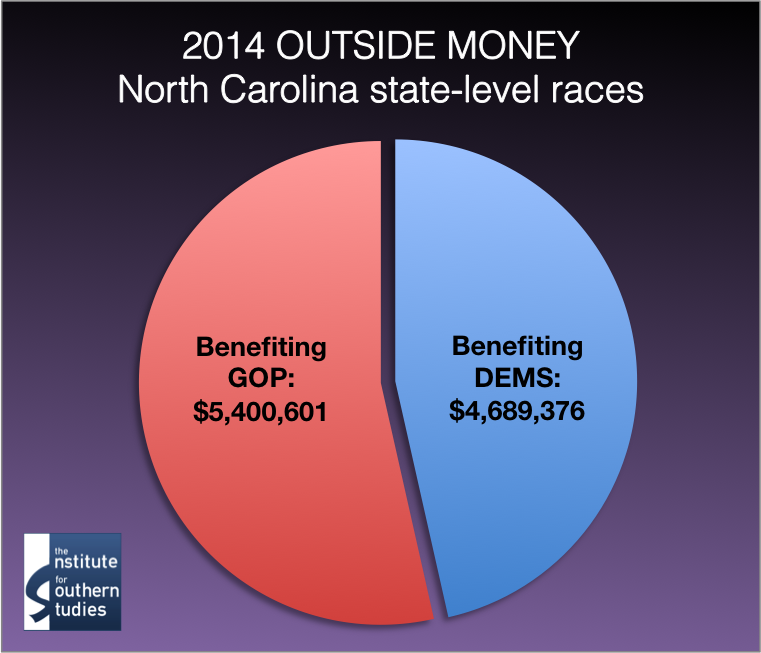Outside political groups spent $10M in NC in 2014, favored GOP

Five years since the U.S. Supreme Court's Citizens United decision lifting restrictions on political spending, outside money continues to flood into North Carolina politics -- and Democrats are starting to catch up with Republicans.
In the wake of the U.S. Supreme Court's 2010 Citizens United decision loosening political spending rules, super PACs and other independent groups have dramatically ramped up their fundraising and spending in North Carolina, generally to the benefit of Republicans. Five years since the pivotal high court ruling, the money keeps flowing -- and Democrats are catching up.
The final 2014 election spending reports are in, and a Facing South/Institute for Southern Studies analysis shows that spending by independent groups (also known as "outside groups") that do not coordinate with candidates topped $10 million in North Carolina state-level races. While the outside spending still favored Republicans, Democrats are catching up. There was also a big jump in independent spending on state legislative races and an unprecedented infusion of outside money by the state Republican Party.
The Institute has logged 1,226 independent expenditures for 2014, as well as many donations to independent groups, on FollowNCMoney.org, an online database that tracks state election reports.*
Here are the key findings from our analysis. See the charts below for more details.
· GOP OUTSIDE SPENDING LEAD SHRINKS: Of the outside money spent in North Carolina in the 2014 election cycle, 53.4 percent benefited Republican candidates. That marks a big change from recent election cycles. For example, of the top 10 outside spending committees in 2012, groups that favored Republicans spent more than double that of Democrat-leaning committees. And in 2010, the GOP enjoyed a 10-to-1 advantage in outside money in the state.
Of the $10.1 million spent by outside groups in N.C. races in 2014, 81 percent was focused on races for the state legislature. Of that spending, almost 57 percent benefited Democrats as liberals sought to erode the GOP's outside spending advantage in recent election cycles.
In N.C. court races, however, 97 percent of spending went towards candidates who were registered Republicans.

· TOP SPENDING GROUPS: Just 10 groups accounted for 88 percent of outside money spent in North Carolina state elections in 2014. Five are conservative-leaning, and the other five are liberal-leaning. The conservative committees accounted for 52 percent of the total spent by the 10 groups.
· BIGGEST-SPENDING COMMITTEE: A new, liberal-leaning 527 political organization, N.C. Families First, led the outside-spending pack with $2.28 million dropped on ads and mailers opposing eight Republican House and Senate candidates, four of whom lost. According to reports filed with the N.C. State Board of Elections, the expenditures by Families First were backed by donations from other North Carolina-based political groups N.C. Citizens for Protecting Our Schools, Real Facts N.C., and the N.C. Futures Action Fund; Raleigh businessman Dean Debnam, who's also the director of the N.C. Futures Action Fund; and Washington, D.C.-based America Votes.
· TOP DONOR: N.C. Citizens for Protecting Our Schools, itself a big independent-spending group, was the biggest source of reported donations to North Carolina outside spending groups. It contributed $1.74 million to N.C. Families First, playing a major role in funding the top-spending committee's independent expenditures. Protecting Our Schools received its funding from the Washington, D.C.-based National Education Association and America Votes as well as the N.C. Futures Action Fund.
· TOP-DRAW RACE: The battle for Democrat Robin Hudson's state Supreme Court seat drew the most outside money, almost all of it coming in the primary election. In April and early May, N.C. Chamber IE, the N.C. Chamber of Commerce's independent expenditure arm, ran ads in support of Hudson's two conservative challengers, Eric Levinson and Jeanette Doran, totaling $345,000. Meanwhile, a little-known super PAC, Justice for All NC, ran a widely-criticized attack ad against Hudson, costing the group $899,000. Hudson survived the primary and general elections to retain her seat on the Court. In all, there were 16 races (14 legislative and two for state Supreme Court) that drew more than $200,000 in outside money.
· BIG GROWTH IN OUTSIDE MONEY: Outside spending on North Carolina legislative races grew dramatically in 2014. According to the N.C. FreeEnterprise Foundation, outside groups spent $2.64 million on such races in 2010, the first elections after the Citizens United ruling. They spent slightly more, $2.97 million, on legislative races in 2012. But in 2014, outside groups spent $8.23 million on N.C. House and Senate races -- nearly three times the 2012 total.
In 2012, a presidential election year, outside groups spent $5.8 million on North Carolina legislative and judicial races combined, with the races for governor, lieutenant governor and other statewide, non-judicial posts drawing the lion's share of that year's $14.5 million total. In the 2014 mid-term elections, outside groups spent over $10.1 million on legislative and court races. This almost two-fold increase in legislative and judicial outside money from a presidential election cycle to a mid-term election suggests record-breaking outside spending to come in 2016.
· DARK MONEY A FACTOR: 30 27 percent** of the total outside money spent in 2014 came from so-called "dark money" groups that don't disclose their donors. Top-spending examples of such groups include 501(c)(3) charitable nonprofit Natural Resources Defense Council, 501(c)(4) "social welfare" nonprofit N.C. Citizens for Protecting Our Schools and 501(c)(6) trade association American Petroleum Institute.
Some other trends of interest:
· INDEPENDENT SPENDING BY A POLITICAL PARTY: A major difference between 2014 and the previous two election cycles was the role of the N.C. Republican Party, which made over $1.9 million on independent expenditures benefiting GOP legislative and court candidates last year. Political parties are allowed to make independent expenditures on behalf of candidates as long as they do not coordinate with the campaigns, although such practices have been challenged in states such as California and Colorado. Last year the N.C. GOP spent heavily on direct mail, voter guides and phone calls in the final weeks before the general election, making it the state's second-biggest outside spender.
· ENVIRONMENTAL GROUPS ENTER OUTSIDE MONEY GAME: Environmental advocacy groups made big independent expenditures on state races, with varying results. The Natural Resources Defense Council and the Southern Environmental Law Center, both 501(c)(3) charitable nonprofits, occupied a legal gray area as politically-spending charities. They combined for almost $970,000 in outside expenditures opposing two Republican state Senate candidates, both of whom went on to win re-election. Meanwhile, the N.C. League of Conservation Voters, classified as a 501(c)(4) "social welfare" nonprofit, made $541,000 in outside expenditures to oppose five GOP House and Senate candidates, three of whom lost their seats. The N.C. Sierra Club PAC spent close to $7,000 in outside money supporting environmentally-friendly legislative and judicial candidates.
(* A note on methodology: FollowNCMoney records all independent expenditure reports and electioneering communications that are filed with the N.C. State Board of Elections and posted to its website. The numbers do not include, for example, ostensibly political ad buys that have not been classified as political spending by the outside groups and/or the board and therefore are not reported.)
(** CORRECTION: The dark money figure of 27 percent was revised down from 30 percent, as originally reported. We had incorrectly categorized NC Citizens for Freedom in Education IE PAC as a 501(c)(4) "social welfare" nonprofit, a type of organization that is not legally required to disclose its donors. But in fact it is a 527 political organization, which is required to make disclosures.)
Tags
Alex Kotch
Alex is an investigative journalist based in Brooklyn, New York, and a reporter for the money-in-politics website Sludge. He was on staff at the Institute for Southern Studies from 2014 to 2016. Additional stories of Alex's have appeared in the International Business Times, The Nation and Vice.com.
